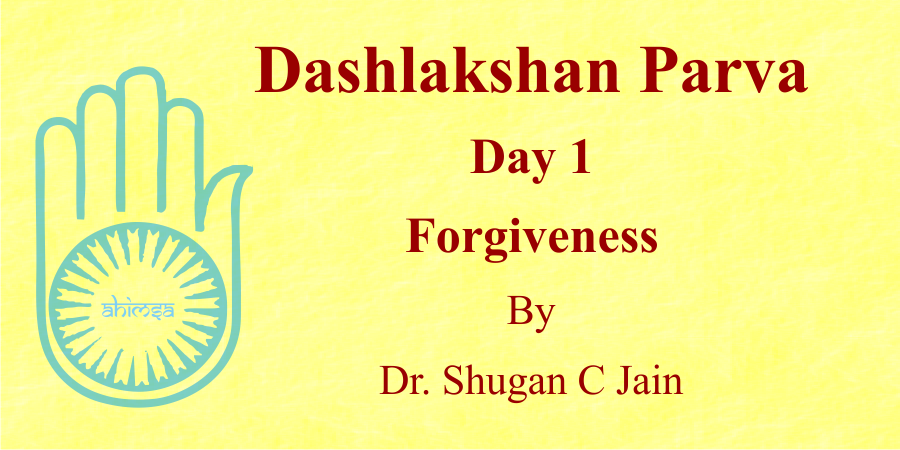Parva means festival. Dashlakshan parva is the holiest annual festival of Digambar Jains that starts from a day after Ganesh Chaturthi and lasts ten days. Jain festivals are like annual vacations in the west when people go for camping to rest and rejuvenate themselves. In Jainism, we celebrate by knowing and contemplating on the nature of true self (pure soul) and practice the five minor vows (minimizing violence, speaking untruth, stealing, increasing possessions or possessiveness and having lustful intentions towards others), observe austerities (particularly fasting, self-criticism and repentance, self-study and charity etc). To understand the true nature of pure soul, Jains prescribe its ten virtues, called dash lakshans. These are:
Uttamksama-mardavarjav-sauca-satya-sanyam-tapa-tyaga-akincana-brahmacaryanidharmah
Meaning: Nature of self or inherent attributes of self are tenfold, namely: Supreme- forgiveness, humility, straightforwardness, truthfulness, cleanliness, giving up, penance, detachment and staying in one’s own nature or celibacy).The first four are to affect our thoughts, the next five are practices to move forward on the path of purification, while the last is the essence of the path or to be in the state of true self (bliss). Supreme implies perfect and the ten perfect virtues belong to the pure soul while we try to practice these as much as possible to be happy and move on to achieve our worldly and trans-worldly objectives.
Today, we shall briefly discuss Forgiveness:
Our Goal: To forebear anger even when provoked without developing a feeling of revenge is supreme forgiveness. It leads to peace of mind, contentment and staying healthy.
Anger and forgiveness are opposite, only one can exist at a time. We forgive those who have wronged us and seek forgiveness from those we have wronged. Forgiveness is sought not just from human colleagues, but from all living beings, including plants, water, insets, birds, animals and human beings. If we do not forgive or seek forgiveness but instead harbour resentment, we bring misery and unhappiness on ourselves and in the process shatter our peace of mind and make enemies. Forgiving and seeking forgiveness oils the wheel of life allowing us to live in harmony with our fellow beings. It also attracts meritorious karma. We, ordinary human beings cannot practice supreme forgiveness and hence try to minimize anger and maximize forgiveness.
Only brave can forgive: The elders (stronger / brave) should forgive the young ones (weak) as the young ones are prone to make mistakes and elders should guide them for correction. Forgiveness by weak can be termed as cowardice. So, we have to become brave to be able to forgive and be happy.
Ill effects of anger (opposite of forgiveness): It is self-destructive at physical (rise of blood pressure, not able to concentrate and resulting life style ailments), mental (stressed and not able to think clearly) and spiritual (karmic bondage) levels. It causes ill-will, hatred and lose temper.
Let us now see how it is practiced in different life situations:
In the family: To say Sorry (and mean it) when we do anything wrong. Try to correct the cause of the mistake done, most probably disrespect/disobedience or causing annoyance to other members. Also forgive others when they say Sorry and be normal thereafter.
In School/college: To say sorry to the teachers and friends for the mistakes committed by you. Also forgive others when they seek it. Forgiveness enhances chances of winning over friends and respect of others.
Dealing with Society, government: To believe and practice interdependence and not independence. To say Sorry whenever one deviates from the norm and mean it, i.e. not repeat it again.
Lifestyle: No one likes an angry person. Also, anger is self-destructive as seen earlier. So, we should not act in a manner that arouses anger in others or in us. Jesus Christ, when he was being crucified. We rouse anger in others by not paying attention to what they say or making fun of them or belittling them or using harsh words for them or giving unsolicited opinions or creating other forms of troubles. So, avoidance of these can result peace of others and hence minimize anger arousal in them at that moment and in you later.

